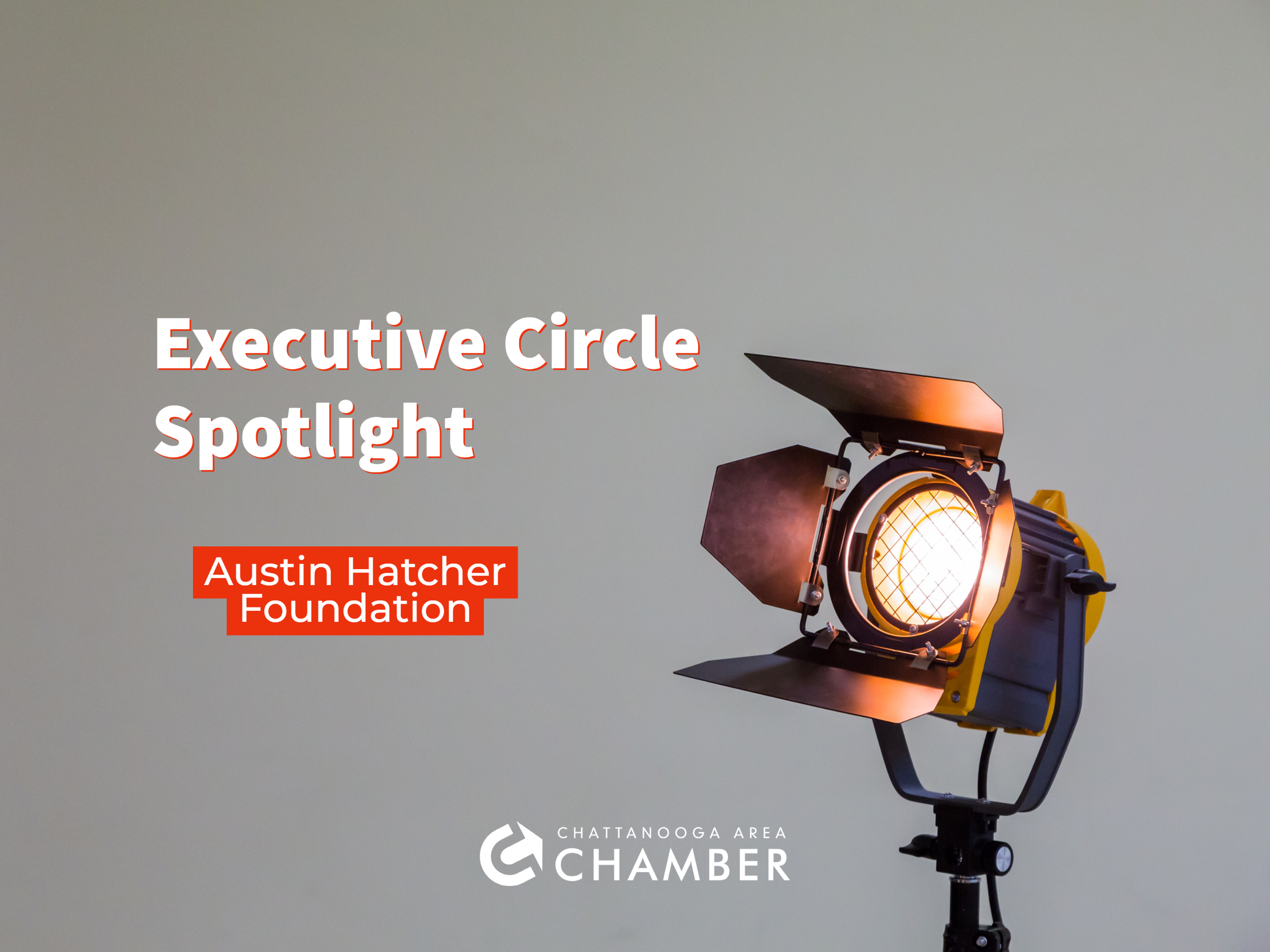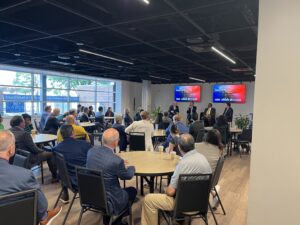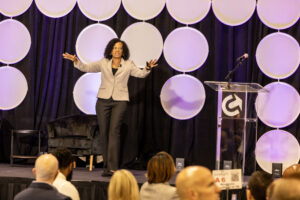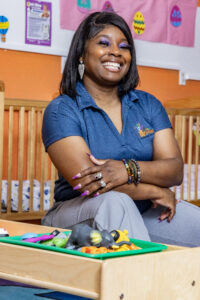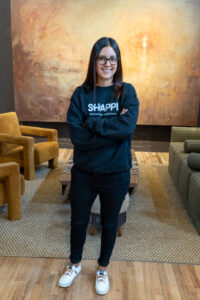This week TREND is spotlighting the Austin Hatcher Foundation for Pediatric Cancer, one of the Chattanooga Chamber’s members from our local philanthropic/nonprofit sector. The Foundation seeks to provide childhood cancer patients and their families –at no cost– with the solutions and support they need throughout every step of their journey through cancer recovery, both during and after treatment. Their vision is that pediatric cancer patients, survivors, and their families can reach their full potential through education, balance, and health/wellbeing.
TREND sat down with the Foundation’s President and CEO Amy Jo Osborn to learn more about the organization and how to get involved.
When was the Austin Hatcher Foundation launched? Recap for our readers where the organization started out, versus where it is today.
The Austin Hatcher Foundation was formed in December 2006. On October 19, 2006, Austin Hatcher (“Hatch”) Osborn, at 11 weeks old, took his last breath. Hatch was diagnosed only 11 days earlier with a very rare and aggressive form of brain and spinal tumors. Ironically, even prior to Hatch’s diagnosis Jim and I had a passion for supporting children’s cancer organizations through the motorsports industry and our race team.
With a clinical understanding, a business mindset, and a desire to keep Hatch’s name alive, Jim and I formed the Austin Hatcher Foundation to fill the unmet service needs of children suffering from cancer and their families, from the moment they’re diagnosed and then throughout their lifetime, helping them to thrive while living with pediatric cancer.
The Foundation began with a vision and mission: Jim and I fundraised to open the nation’s only psychosocial, evidence-based, “whatever-it-takes-for-families-to-thrive” pediatric cancer center.
Within 15 years, the Foundation has grown over 1600 percent and gradually moved from 2,500 square feet of office space beginning in 2009, to now 33,000 square feet. More than $4.4 million in services are provided annually to children with cancer and their families.
Childhood cancer is an experience that extends beyond diagnosis, affecting every family member in different ways – therefore each individual family member needs unique solutions to whatever challenges they’re facing.
The Foundation’s psychosocial services are focused on providing children and families, upon receiving their cancer diagnosis, with the tools they need to cope during the present and thrive in the future. Our Education Advancement Center houses evidence-based programs to address each child and family members’ needs, including:
- Counseling for mental health and wellbeing (individual, trauma, grief, sibling, and family
- Industrial arts (shop class)
- Occupational therapy (physical, sensory, or cognitive development)Art + music therapy (to enhance emotional and physical function)Family programming (Day camps, events for parents and siblings))Therapy for cognitive and behavioral healthSibling support (individual counseling and enrichment)Academic support (IEP/504 Plan, tutoring and virtual learning)Neurocognitive testing (Measure cognitive abilities, attention, problem-solving, memory, language, IQ, visual/spatial skills, academic skills, and social-emotional function)
- Career counseling and college prep.
Services are provided regardless of a family’s socioeconomic status, residency, or treatment provider. There is no charge for any of these services, and neither will insurance be billed.
How many people have benefited from your support? Run us through the numbers on how you measure impact.
The Foundation has served over 88,000 individuals across 26 states and 42 hospitals. In Chattanooga, the foundation provided services valued at more than $4.4 million during just the first ten months of this year.
Our impact is measured by the number of hours for care provided by clinical and support programs and its monetary equivalent, as well as qualitative self-reported benefits gathered through surveying patients and families as well as medical documentation.
The Foundation measures our success by the mental health and wellbeing of the patients, siblings and caregivers we serve. This can be defined by way of neurocognitive assessments, implementation of educational and psychological services, individual and group counseling sessions, and the matriculation of individuals through each service or program.
In recent times, the term “conscious [or compassionate] capitalism” has been heard often. Do you believe for-profit enterprises can pursue a philanthropic mission and still prosper at the same time?
Absolutely. Folding a philanthropic cause into a business’s mission and work can be equally as impactful as the quality of the products they’re selling. Companies that give back to their community also improve their own business climate and increase customer loyalty.
Philanthropy enhances a company’s community goodwill, brings its social and economic goals into alignment, and improves its long-term business prospects among both employees and consumers.
Recent trends show many entrepreneurs launch their startups with philanthropic missions. What can businesses gain by incorporating philanthropy into their mission?
A cause marketing strategy can demonstrate to a company’s customer base that they’re committed to both social and economic growth. Studies have shown most consumers will pay more for a product or service when they know the business has made a commitment to give back. In this respect, the customer understands their purchase will trigger a good that extends beyond just themselves, and they then get to feel that they’re a part of something bigger.
So, can philanthropy be a mechanism by which to recruit talent and foster a healthy workplace culture?
Prospective employees care about working for companies with a philanthropic lens to their work. By focusing on Corporate Social Responsibility (CSR), organizations can give their employees an opportunity to make an impact both in their specific role as well as beyond the company itself, out into the broader community.
Employees who receive an offer to participate CSR goals and programs feel more engaged in the workplace and internal morale is boosted accordingly. That higher morale leads to more creativity, a growth mindset, and better recruitment and retention of top talent.
What are some specific ways businesses can get involved with the Austin Hatcher Foundation?
We thrive on partnerships with companies and can develop a business plan that works for both parties.
The Austin Hatcher Foundation offers opportunities for businesses and their employees to get involved through cause marketing campaigns, round-up donation campaigns, event sponsorships, fundraiser table/ticket purchases for employees, internal employee engagement, volunteering at charity and family-program events (among others), matching gifts, and much more!
What upcoming events or other initiatives would you like to share with TREND’s readers?
In the first quarter of 2023, we have three events coming up. “Hit It for Hatch,” a doubles tennis mixer, will be held on January 7 at McCallie School. This is the first of what will be an annual event, thanks to the hard work and ingenuity of the Foundation’s Teen Ambassadors. There are four flights available for registration—two adult, one middle school, and one high school. It’ll be a fun one, you won’t want to miss it!
Second, the “Bubbles of Fun Run” (5K or 10K) will be held on February 25 at the Chattanooga Riverwalk. If you need to work on your run times, are training for a marathon, just want to get in a great morning walk or take the family out, this is the event for you. The race will kick off at 8:15am and there’ll be snacks, games, bubbles and lots more.
And on March 27 we’ll host the “Monday Before the Masters.” This is more of a boutique style golf tournament and a great way to spend the day out on the course with colleagues, business partners, or friends. The winning team of four receives a Bruce Baird custom “Masters” jacket.
Finally, we’re growing steadily and need to expand services so also in January we’ll launch a larger fundraising effort that will run through late 2024. Anyone interested who wants to learn more about how to get involved with that campaign, they can feel free to contact me at [email protected].
